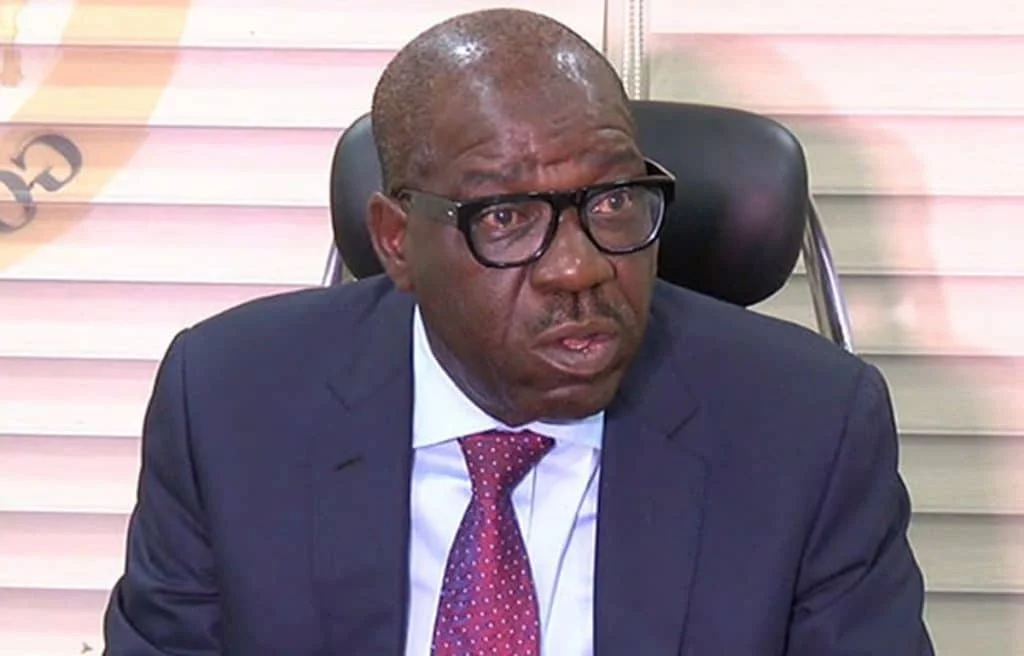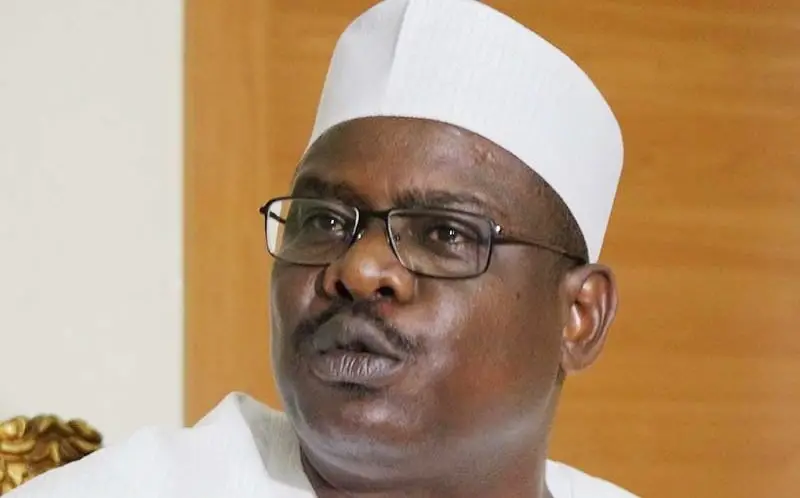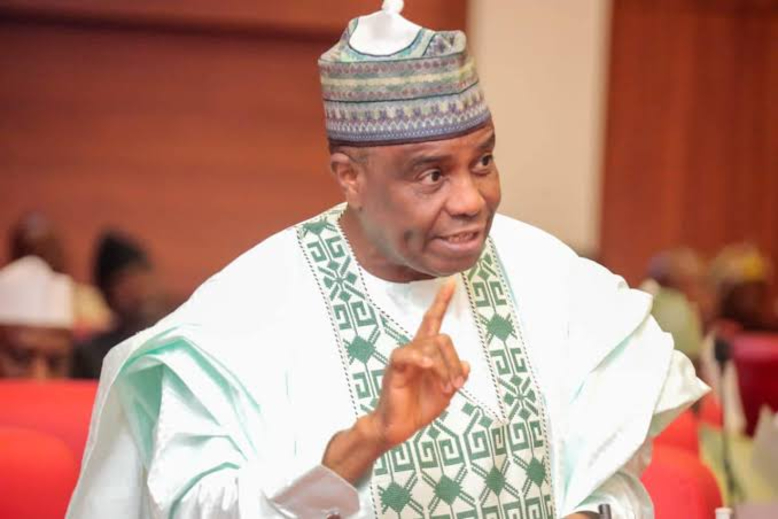News
OPINION: ‘An Enemy Of The People’ [Monday Lines]

By Lasisi Olagunju
“The water is poisoned! The whole of the water system is tainted and absolutely unusable for its purpose,” Thomas Stockmann, medical doctor, accomplished scientist, informs the people around him. He is employed to look after the health of the people and the public baths, the mainstay of his town’s economy. It is in the course of that job that he makes a scientific discovery that the baths are dangerously polluted, and that they spread typhoid. And he says so.
Dr. Thomas Stockmann is the protagonist in Henrik Ibsen’s 1882 play, ‘An Enemy of the People’. We were taught long ago that literature is a reflection of life. We were also taught that literature is the lamp that lights the way of life, past to present – and back to the past. We were taught that drama as a mirror shows us what life truly is. Life itself is a drama, a stage on which we all fret and strut until the light goes out on us. Ibsen’s Thomas Stockmann, public enemy number one, is used here in my celebration of the near end of a particularly dramatic year, our love for false gods and our stoning of the wrong Satan.
I have skimmed through Gabriel Fallon’s ‘Prophecy in the Theatre’ (1956), his quote on drama as a member of the human life – human thought and morality. I have scanned J.C. Kamerbeek’s ‘Prophecy and Tragedy’ (1965), his discussions on dramatic structure and tragic meaning. There is a sense in which the dramatic can be prophetic.
Back to ‘An Enemy of the People’. The drama is in the plot. The setting is a coastal town in southern Norway. Authorities of the town get a hint of Dr Stockmann’s findings on their polluted water. Alarmed and agitated, they meet with him for negotiations. They ask their medical doctor to keep quiet, to shut up. The public must not hear what he is saying. It will create a panic in the town. It will hurt the town and its economy; tourists will stop coming, investors will lose money.
MORE FROM THE AUTHOR: [OPINION]Farotimi: A Trial Of The Supreme Court
But this doctor is a loud-mouthed stubborn dude. He insists on speaking ‘the truth’. He thinks he has a moral obligation to protect the community from avoidable diseases, from even death.
On more than one occasion, Doctor tells the people that previous unexplained deaths are due to the poisoned water: “Last year, there were people who died from a disease that spread through the town, and I am certain that the cause of it was the poisoned water. I told you then, and I tell you now—this water will kill us all.” His decision to talk, he is certain, is the right course of action. “It is my duty to lay bare the facts in the matter. Every conscientious man must support me in this!”
But the system supports only the “moderate.” Dr Stockmann’s own brother, Peter Stockmann, is the mayor of the town. And it is this brother that openly leads the opposition against this doctor, against his discovery of the pollution and against his audacity to tell.
When the state is on your case, it doesn’t rain; it pours. The press soon shuts out our doctor. His editor-friends renege on their promise to publish his findings. They claim they can’t offend their funders. The stubborn medical doctor turns to himself. He resolves to speak directly to the people “in a way that they shall understand” and “drive all the wolves out of the country.” There is a town hall meeting where Stockmann proposes to officially announce his findings: “I am telling you the truth! The entire water system is tainted. People are going to die from this. We must close the baths and have them disinfected. We must stop this typhoid epidemic before it spreads further.”
MORE FROM THE AUTHOR: OPINION: In Defence Of Nepotism [Monday Lines]
His brother, the Mayor, hijacks the town hall meeting from him. The Mayor addresses the people. He tells them that his brother’s proposal is injurious to everyone in the town. The repairs he proposes will cost ratepayers “an unnecessary expenditure of some thousand pounds.” From the crowd comes a voice suggesting that the doctor be officially declared a public enemy.
Dr Stockmann watches as the townspeople he is fighting for respond with shouts:
“Yes! Yes! He’s an enemy of the people!”
“He hates his country! He hates his own people!”
“We can’t have someone like him in our town!”
Then a motion follows from someone our medical doctor trusts as his key supporter:
“Dr. Stockmann has shown himself to be an enemy of the people. Therefore, I propose that this gathering officially declares him an enemy of the people.” The vote is by ballot; everyone votes. Dr Stockmann gets one vote – the lone vote comes from a drunk attendee, the village drunkard.
MORE FROM THE AUTHOR: OPINION: Of Kings, King Kong And Honour
Our man is defeated but the crowd is not satisfied with what they have done to their doctor.
“Let us go and break his windows! Enemy of the people!” The whole crowd yells.
The consequences are grave. He is dismissed from his job. His daughter loses her teaching job; his landlord ejects him; his little boys suffer bullying in school and are told to excuse classes until further notice. Everyone who should help him avoids him. They say they dare not annoy “the majority” and their “public opinion.”
The play ends without a reprieve for “the enemy of the people.” But the man insists that he is the strongest man and that “the strongest man in the world is he who stands most alone.” I think he is naive. That is not what the world is. The one who stands alone stays alone and lonely and without power. Power resides where people stand. The people stand where power is. That explains, perhaps, why Donald Trump is Time Magazine’s ‘Person of the Year’.
We started 2024 eleven and a half months ago bitterly divided over what was truly evil and what was godly. We are ending the year divided still over who is angel and who is Satan. In the next two weeks, it is almost certain that we will roll over into the new year the raging Dele Farotimi vs Afe Babalola war of ‘justice’. There is also the tug of war over whether the tax reform bills potentially threaten or benefit the poor. In those two cases, we will be made to state who our “enemy” is. Unfolding also is the Kemi Badenoch/Yoruba vs Kashim Shettima/ Northern Nigeria debate. In 2025, Ibsen’s ‘An Enemy of The People’ will be staged across the entirety of our court and political systems. May God keep us alive – and well.
News
Ex-Edo Gov Obaseki Reacts As His Cousin Is Beaten, Stripped

The immediate past governor of Edo State, Godwin Obaseki, has reacted to the attack on Don Pedro Obaseki, the Chief Executive Officer of Osamudia Farms.
Don Pedro Obaseki, a cousin to the immediate past governor was attacked at Uwa Primary School where he went to play football.
In a viral video, Pedro Obaseki is seen kneeling at the Oba of Benin Palace gate, before he was dragged into the palace where he was asked to crawl before some chief walked up to the scene and rescued him.
Reacting, the ex-Edo governor described the act as a “grave violation of fundamental human rights and a reckless disregard for the rule of law.”
READ ALSO: Obaseki Beaten, Stripped In Edo
Obaseki, said: “I call on security agencies to immediately investigate this matter thoroughly and transparently, identify those responsible for this barbaric act and ensure they are held accountable in accordance with the law.
“A situation where thugs and non-state actors appear to freely take the law into their own hands on behalf of high-profile individuals and those in positions of authority can only result in one outcome, a degeneration into a state of anarchy, which will do no one no good.”
He further charged, “I urge human rights organizations, civil society groups, and all well-meaning Nigerians to lend their voices and speak out firmly against this injustice and gross violation of human rights.”
News
New Tax Laws: Suspend January 2026 Implementation — Senator Ndume Tells Tinubu

Former Senate Leader, Ali Ndume has appealed to President Bola Ahmed Tinubu to suspend the January 1, 2026, implementation of the country’s new tax laws amid growing controversy.
The federal lawmaker made the appeal in a statement he issued on Wednesday in Abuja.
This comes as the Nigerian Bar Association demanded the suspension of the implementation.
Recall that a member of the House of Representatives, Abdussamad Dasuki, had last week called the Parliament’s attention to alleged alteration to the tax laws.
READ ALSO:FIRS Confirms NIN As Tax ID
Chairman of the Presidential Fiscal Policy and Tax Reforms Committee, Taiwo Oyedele, in an interview on Arise Television on Wednesday, called for calm over claims of alterations in tax laws and urged Nigerians to allow lawmakers to complete their investigation before drawing conclusions.
Speaking on the ongoing controversy about the tax laws, Ndume noted that proceeding with the implementation without getting to the root of the alleged forgery will create a legitimacy challenge for the tax laws.
His statement read, “With the controversy surrounding it, the President should constitute a team to verify the veracity of the claim and act accordingly.
“As the responsive leader that he has always been, he should look at it to find out if the copy that was signed and the claim of alterations are genuine so that he will do the needful to bring the controversy to rest.
READ ALSO:US Threatens To Sanction Countries That Vote For Shipping Carbon Tax
“If not, the controversy will continue.” That is to say, the tax law will not be implemented, because you can’t build on nothing.
“So, Mr. President should suspend the implementation until the issues are resolved because so many civil society organizations, the Arewa Community, and the Nigerian Bar Association are saying that he should withdraw the tax law and investigate the allegation of forgery.”
“Therefore, Mr President should get to the root of the allegation of forgery. The small committee that will be set up should look into it while the House of Representatives does its own.”
News
Tambuwal Engages Security Agencies As US Airstrikes Hit Own LG In Sokoto

Senator Aminu Waziri Tambuwal, representing Sokoto South, has called on residents of Sokoto State to remain calm following reports of United States airstrikes targeting ISIS-linked terrorists on Christmas Day.
In a statement posted on his personal X account, the former Sokoto State governor said he was aware of reports concerning the airstrikes, which marked a direct US military action in Nigeria based on intelligence about ISWAP threats, and urged citizens to remain law-abiding while authorities clarify the situation.
“I have noted the reports concerning an airstrike carried out as part of ongoing counterterrorism efforts through cooperation between the federal government of Nigeria and the United States,” Tambuwal said. “I urge our communities to remain calm and law abiding as relevant authorities clarify the circumstances surrounding the operation.”
READ ALSO:US Dept Of War Shares Video Of Air Strikes In Nigeria
Tambuwal assured constituents that he was engaging with relevant security agencies to obtain full details of the operation and to ensure that necessary things were in place to protect civilians.
“I wish to assure the people of Sokoto South that I am in active talks with relevant security authorities to obtain full details and ensure that all necessary safeguards are upheld,” he added.
The senator emphasised that counterterrorism operations were aimed strictly at criminal and terrorist elements threatening public safety, not innocent civilians who are often victims of insecurity. He stressed that the protection of civilian lives must remain central to all legitimate security actions.
He further called on community leaders, traditional institutions and residents to work closely with security agencies by sharing credible intelligence and resisting misinformation capable of causing fear or heightening tension.

 News4 days ago
News4 days agoJUST IN: Kano Lawmaker, Sarki Aliyu Daneji, Dies Hours After Colleague’s Passing

 News5 days ago
News5 days agoFULL LIST: Churches That Don’t Celebrate Christmas

 Headline3 days ago
Headline3 days agoJUST IN: US Forces Bomb Terrorists Camps In Nigeria

 Headline3 days ago
Headline3 days agoUS Dept Of War Shares Video Of Air Strikes In Nigeria

 News3 days ago
News3 days agoOkpebholo Slams ₦25bn Libel Suit On Edo PDP Chairman

 News5 days ago
News5 days agoOPINION: The Day Friendship Died

 Entertainment4 days ago
Entertainment4 days agoAFCON 2025: Davido Wins $96,000 After Super Eagles Beat Tanzania

 News4 days ago
News4 days agoSheikh Gummi Sues Two Over Alleged False Facebook Publication

 News5 days ago
News5 days ago7 Health Risks Of Owning A Cat

 Headline4 days ago
Headline4 days agoCoup: Guinea-Bissau Junta Releases Six Held Opposition Politicians


























